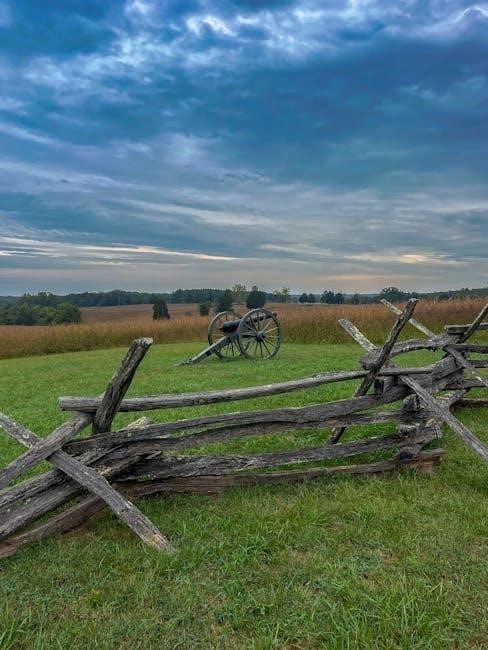American historiography explores the study and interpretation of U․S․ history, shaped by evolving methodologies and perspectives․ It examines how historians analyze the past, reflecting changing societal values and intellectual trends․
1․1 Definition and Scope of Historiography
Historiography refers to the study of historical writing and interpretation, examining how historians analyze and present the past․ It encompasses the methodologies, perspectives, and debates that shape historical narratives․ The scope of historiography includes the evaluation of primary sources, the application of theoretical frameworks, and the influence of cultural and intellectual contexts․ Historians’ motives often reflect their time and place, as noted by scholars like Frederick Jackson Turner and Charles Beard․ This field also explores how historical interpretations evolve, addressing themes like race, class, and gender․ By analyzing diverse viewpoints, historiography reveals the complexity of understanding the past, making it a dynamic and essential tool for critical inquiry into American history․
1․2 Evolution of Historical Writing in America
Historical writing in America has evolved significantly, reflecting changing perspectives and methodologies․ Early colonial accounts focused on settlement and religious themes, while 19th-century historians often emphasized nationalism and progress․ The 20th century saw the rise of professional historiography, with scholars like Frederick Jackson Turner and Charles Beard introducing new frameworks, such as the frontier thesis and economic interpretations․ The civil rights movement and social upheavals of the 1960s spurred more inclusive histories, addressing race, gender, and class․ Recent decades have embraced transnational and digital approaches, expanding the scope of historical inquiry․ This evolution highlights how historical writing in America has become more diverse, interdisciplinary, and critically engaged, offering deeper insights into the nation’s complex past and its global connections․


Key Themes in American Historiography
Key themes include race, class, gender, economic factors, and political movements, shaping interpretations of American history and its complex societal and cultural developments over time․
2․1 The Frontier Thesis and Its Impact
The Frontier Thesis, introduced by Frederick Jackson Turner in 1893, posits that the American frontier shaped the nation’s democracy, identity, and institutions․ Turner argued that the frontier’s vastness fostered self-reliance, innovation, and a unique American character․ This idea profoundly influenced historiography by shifting focus to westward expansion and its role in national development․ Critics, however, contend that Turner’s thesis overlooked the experiences of indigenous peoples and the complexities of racial and ethnic diversity; Despite these critiques, the Frontier Thesis remains a foundational concept in American historiography, highlighting the importance of environmental and geographical factors in shaping historical narratives․ Its enduring legacy underscores the dynamic interplay between land, culture, and power in American history․
2․2 The Role of Race and Ethnicity in American History
Race and ethnicity have played pivotal roles in shaping American history, influencing social structures, cultural identities, and political dynamics․ Historians have extensively explored how slavery, segregation, and immigration shaped the nation’s development․ The experiences of African Americans, Native Americans, and various immigrant groups highlight the complexities of inclusion and exclusion․ Key events, such as the Civil War, Reconstruction, and the Civil Rights Movement, underscore the enduring impact of racial divides․ Historiography has increasingly emphasized the agency of marginalized groups, challenging earlier narratives that often overlooked their contributions․ The study of race and ethnicity reveals how power dynamics and identity formation have been central to the American experience, shaping both conflict and progress․ This perspective continues to inform contemporary debates on equality and justice, making it a vital area of historical inquiry․

2․3 The Influence of Economic Factors
Economic factors have profoundly shaped American history, with historians examining how capitalism, industrialization, and labor movements influenced societal development․ The rise of industrial capitalism in the 19th century transformed the U․S․ economy, creating wealth disparities and fueling urbanization․ The Great Depression and New Deal policies further highlighted the interplay between economic systems and government intervention․ Historians like Charles Beard emphasized economic motivations in shaping political decisions, while others explored the impact of globalization and trade on domestic policies․ Economic interpretations have also addressed the exploitation of labor, the growth of consumer culture, and the role of technology in driving progress․ These analyses reveal how economic forces have shaped social hierarchies, cultural norms, and political ideologies, making them a cornerstone of American historiography․ Understanding these dynamics remains crucial for interpreting the nation’s past and present․
2․4 The Significance of Political and Social Movements
Political and social movements have played a pivotal role in shaping the trajectory of American history, reflecting the nation’s ongoing struggle for equality, justice, and democracy․ From the Civil Rights Movement to the women’s suffrage movement, these collective efforts have challenged existing power structures and redefined societal norms․ Historians emphasize how these movements have influenced policy changes, cultural shifts, and the broader American identity․ The labor movement, for instance, fought for workers’ rights, while the civil rights era addressed systemic racism and segregation․ These movements not only shaped historical events but also inspired new historiographical perspectives, highlighting marginalized voices and experiences․ By examining these struggles, historians gain insights into the complexities of American society and the enduring quest for a more equitable future․
2․5 The Emergence of Gender and Class Studies
The emergence of gender and class studies has significantly expanded the scope of American historiography, offering new perspectives on social dynamics and power structures․ Historians began to explore how gender roles shaped experiences across racial, ethnic, and economic lines, while class studies highlighted inequalities and labor struggles․ These approaches challenged traditional narratives that often overlooked marginalized groups․ The integration of gender analysis revealed the ways women navigated societal expectations and contributed to historical events beyond traditional domestic roles․ Similarly, class studies examined the lives of workers, the labor movement, and the impact of capitalism on American society․ These frameworks have enriched historiographical debates, enabling a more nuanced understanding of identity, inequality, and social change․ By focusing on these dimensions, historians have created a more inclusive and multifaceted portrayal of American history, reflecting the diverse experiences of its people․

Influential Historians and Their Contributions
Pioneering historians like Frederick Jackson Turner, Charles Beard, and Howard Zinn reshaped American historiography with groundbreaking theories on frontier expansion, economic interpretations, and people’s history perspectives, influencing scholarly debates profoundly․
3․1 Frederick Jackson Turner and the Frontier Thesis
Frederick Jackson Turner, a pivotal figure in American historiography, introduced the Frontier Thesis in 1893, arguing that the frontier shaped American identity, democracy, and institutions․ In his seminal essay, The Significance of the Frontier in American History, Turner contended that the frontier experience fostered traits like individualism, self-reliance, and innovation, distinguishing the U․S․ from Europe․ He emphasized the frontier’s role in westward expansion and the closing of the frontier in 1890 as a defining moment in American history․ Turner’s thesis dominated historical discourse for decades, influencing interpretations of national development and identity․ However, critics later challenged its limitations, such as overlooking the experiences of Native Americans and other marginalized groups․ Despite these critiques, Turner’s work remains a cornerstone of American historiography, shaping how historians understand the nation’s territorial and cultural evolution․

3․2 Charles Beard and the Economic Interpretation of History
Charles Beard, a groundbreaking historian, revolutionized American historiography with his economic interpretation of history․ In works like An Economic Interpretation of the Constitution of the United States (1913), Beard argued that historical events, including the drafting of the Constitution, were driven by economic self-interest rather than altruistic ideals․ This perspective challenged traditional narratives that emphasized political or moral motivations․ Beard’s approach emphasized class conflict and the role of economic elites in shaping policy and institutions․ While his theories faced criticism for oversimplification, they remains influential, encouraging historians to explore the material underpinnings of historical events․ Beard’s work laid the foundation for later scholars to examine how economic factors have shaped American history and society, making him a pivotal figure in the development of historiographical thought․
3․3 William Appleman Williams and the Concept of Empire
William Appleman Williams was a leading historian known for his critical analysis of American expansionism and imperialism․ His seminal work, The Tragedy of American Diplomacy (1959), introduced the concept of “empire” as a central theme in American history․ Williams argued that the United States, from its inception, pursued empire through economic and cultural means, often masking expansionist policies under the guise of moral or ideological justifications․ He emphasized the role of economic imperialism, particularly the “Open Door Policy,” which sought to expand American influence globally․ Williams’ work challenged traditional narratives of American exceptionalism, offering a more nuanced understanding of U․S․ foreign policy and its impact on global relations․ His ideas significantly influenced the New Left historians and remain relevant in contemporary debates about American power and imperialism․
3․4 Howard Zinn and the People’s History Perspective
Howard Zinn, a prominent historian and activist, revolutionized American historiography with his groundbreaking work, A People’s History of the United States (1980)․ Zinn’s approach challenged traditional narratives by centering the experiences of marginalized groups, including indigenous peoples, laborers, women, and African Americans․ He critiqued the power structures and policies that perpetuated inequality, offering a counter-narrative to the dominant accounts of American progress․ Zinn’s perspective emphasized the agency of ordinary people in shaping history, rather than focusing solely on political and economic elites․ His work has had a profound impact on how history is taught and understood, inspiring a more inclusive and critical approach to historical inquiry․ Zinn’s legacy continues to influence contemporary historiography, particularly in the realms of social and cultural history․
3․5 Gordon Wood and the Republican Synthesis
Gordon Wood, a Pulitzer Prize-winning historian, has profoundly shaped American historiography through his work on the Revolutionary and early national periods․ His seminal book, The Creation of the American Republic, 1776–1787 (1969), introduced the concept of “republican synthesis,” which integrates political, social, and intellectual history; Wood argued that the American Revolution was driven by a shift from monarchical to republican values, emphasizing the role of liberty, civic virtue, and the rise of democratic ideals․ His later work, The Radicalism of the American Revolution (1992), further explored the Revolution’s transformative impact on American society․ Wood’s approach bridges traditional and revisionist histories, offering a nuanced understanding of the founding era․ His scholarship has significantly influenced contemporary debates on republicanism, democracy, and the origins of American political culture․

Recent Trends in American Historiography
Recent trends include the integration of digital humanities, transnational perspectives, and memory studies, expanding historical narratives beyond traditional frameworks․
4․1 The International and Transnational Turns
The international and transnational turns in American historiography have reshaped how historians interpret the nation’s past within global contexts․ These approaches emphasize connections between the United States and other regions, moving beyond traditional nation-centered narratives․ The international turn focuses on U․S․ foreign relations, diplomacy, and imperialism, while the transnational perspective explores cross-border flows of people, ideas, and goods․ Historians now examine topics like globalization, migration, and cultural exchange to understand America’s role in a interconnected world․ This shift has led to studies of U․S․ empire, global capitalism, and the impact of international events on domestic policies․ By situating American history within broader global frameworks, scholars offer a more nuanced understanding of the nation’s influence and its place in worldwide dynamics․
4․2 The Rise of Digital History and Its Methodologies
The rise of digital history has transformed the field of American historiography by introducing innovative methodologies and tools․ Digital history leverages technology to analyze and present historical data, enabling scholars to process large datasets, create interactive visualizations, and engage audiences in new ways․ Tools like data mining, geographic information systems (GIS), and digital archives have expanded the scope of historical research․ Digital methodologies also facilitate collaborative projects, such as crowd-sourced transcription initiatives and open-access databases․ Additionally, digital platforms have democratized history, allowing public participation and fostering a broader understanding of the past․ While these advancements offer immense potential, they also raise questions about the interpretation and preservation of digital sources․ As technology evolves, digital history continues to reshape how historians conduct research and communicate their findings․
4․3 The Integration of Memory Studies
The integration of memory studies into American historiography has broadened the field by exploring how collective memory shapes historical narratives․ This involves analyzing cultural practices, commemorations, and personal narratives to understand societal remembrance and interpretation of the past․ Drawing on insights from scholars like Pierre Nora and Jan Assmann, historians examine “sites of memory,” such as monuments and holidays, reflecting and influencing American identity․ This approach enriches historical research by incorporating diverse perspectives, including oral histories and digital archives of personal stories․ However, it also poses challenges like memory’s subjectivity and potential misinformation․ Despite these, memory studies provide valuable insights into the dynamic relationship between history and remembrance, deepening our understanding of America’s past and its contemporary impact․
4․4 The Growing Importance of Public History

The growing importance of public history has transformed how historical knowledge is disseminated and consumed․ Public history emphasizes making history accessible to broader audiences through museums, documentaries, digital platforms, and community projects․ It bridges the gap between academic historians and the general public, fostering engagement with the past in meaningful ways․ This approach often involves collaboration with professionals outside academia, such as filmmakers, curators, and educators․ Public history also prioritizes inclusivity, encouraging diverse perspectives and narratives that reflect the experiences of marginalized communities․ By leveraging digital tools, public history has expanded its reach, enabling interactive and immersive learning․ However, it also raises questions about the balance between scholarly rigor and public accessibility․ Overall, public history plays a vital role in shaping historical consciousness and promoting civic engagement, making it a cornerstone of contemporary American historiography․

The Role of Historiography in Understanding American History
Historiography in American history provides a framework for analyzing historical narratives, incorporating various interpretations, and connecting past events to current societal challenges and debates, aiding in understanding historical complexities․
5․1 Historiography as a Tool for Critical Analysis
Historiography serves as a powerful tool for critical analysis, enabling historians to examine how historical narratives are constructed, interpreted, and reinterpreted over time․ By analyzing diverse historical perspectives, scholars can uncover biases, assumptions, and methodologies that shape historical accounts․ This process fosters a deeper understanding of how events have been perceived and presented, highlighting the subjective nature of historical knowledge․ Critical analysis through historiography also encourages the evaluation of evidence, sources, and context, revealing how historians’ interpretations evolve in response to societal changes․ Furthermore, it challenges readers to question dominant narratives and consider alternative viewpoints, promoting a more nuanced comprehension of the past․ Ultimately, historiography as a tool for critical analysis empowers individuals to engage with history more thoughtfully, fostering intellectual curiosity and a critical mindset․
5․2 The Impact of Historiographical Debates on Contemporary Issues
Historiographical debates significantly influence contemporary issues by shaping public perception, policy, and social discourse․ Interpretations of historical events often reflect current ideological struggles, making history a contested terrain․ For instance, debates over the legacy of slavery, the Civil War, and Reconstruction resonate in modern discussions about race, justice, and equality․ Similarly, differing views on American expansionism inform perspectives on imperialism and global intervention․ Historians’ arguments about economic inequality, such as those rooted in the Progressive and New Left traditions, impact contemporary policy debates on capitalism and social welfare․ These debates also inform identity politics, as histories of marginalized groups challenge dominant narratives․ By engaging with these discussions, historians contribute to ongoing conversations about democracy, freedom, and justice, demonstrating how the past remains central to understanding the present and shaping the future․

American historiography has evolved significantly, reflecting changing societal values and intellectual frameworks․ It continues to shape our understanding of the past, informing future historical inquiry and public discourse․
6․1 The Evolution of American Historiography
American historiography has undergone significant transformations, reflecting broader intellectual and societal shifts․ Early historiography often focused on grand narratives of nation-building and progress, emphasizing political and military events․ Over time, historians began incorporating diverse perspectives, such as social, cultural, and economic analyses․ The late 19th and early 20th centuries saw the rise of professional historiography, with scholars like Frederick Jackson Turner and Charles Beard challenging traditional views․ The 1960s and 1970s brought a wave of revisionism, emphasizing the experiences of marginalized groups and critiquing dominant narratives․ Today, American historiography is characterized by interdisciplinary approaches, globalization, and digital methodologies․ This evolution highlights the dynamic nature of historical inquiry, as scholars continually reinterpret the past to address contemporary questions and debates․
6․2 The Future Directions of Historical Inquiry
The future of American historiography is likely to be shaped by interdisciplinary approaches, digital innovations, and a focus on global perspectives․ Historians are increasingly incorporating methods from fields like environmental science, digital humanities, and cultural studies to explore new dimensions of the past․ The rise of digital history platforms and tools is enabling scholars to analyze vast datasets and present findings in innovative ways․ Additionally, there is a growing emphasis on transnational and global histories, which contextualize American experiences within broader international frameworks․ Public history initiatives are also gaining prominence, making historical research more accessible and engaging for diverse audiences․ As these trends evolve, historians will continue to refine their methodologies, ensuring that historical inquiry remains relevant and responsive to contemporary challenges and questions․
